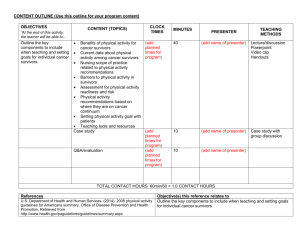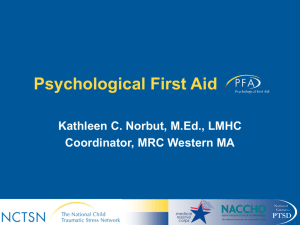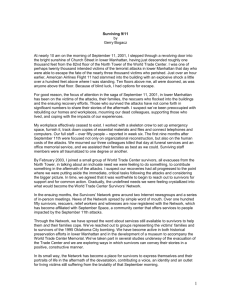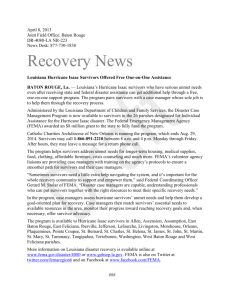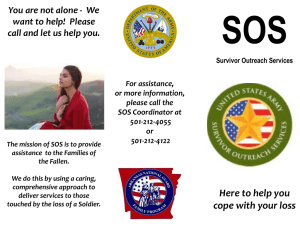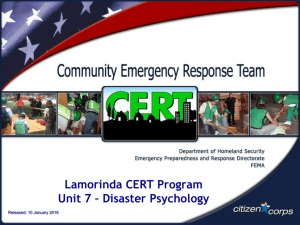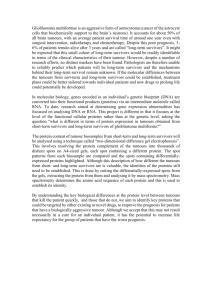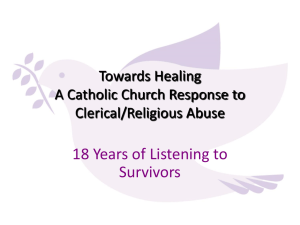DISASTER PSYCHOLOGY - City of Dearborn Heights
advertisement
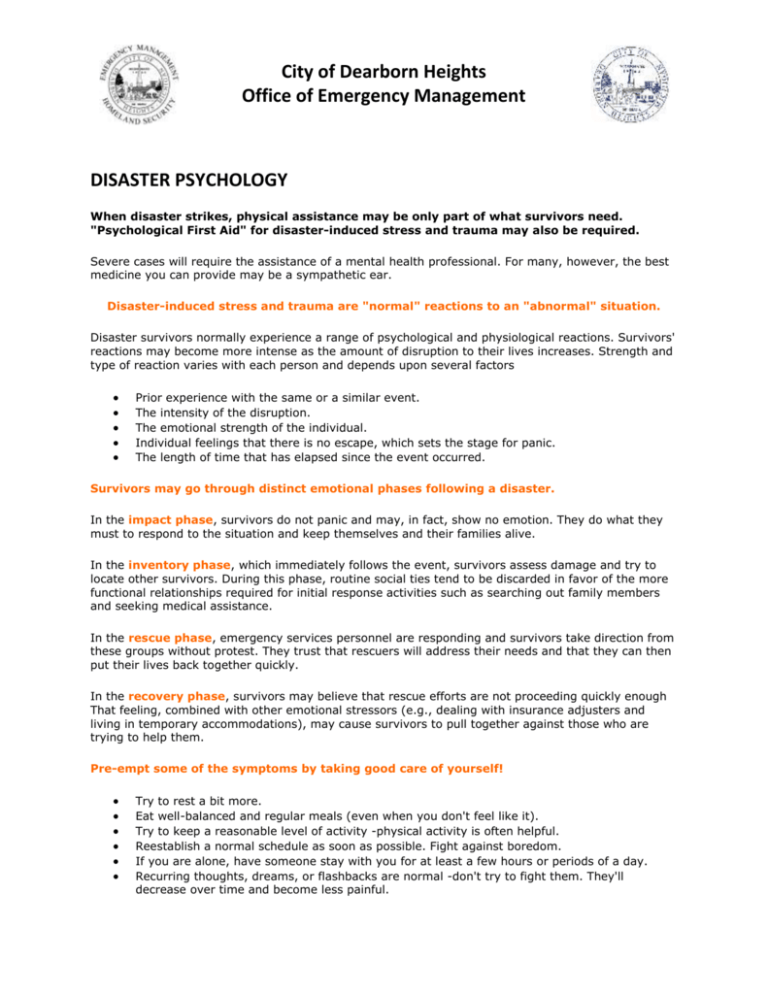
City of Dearborn Heights Office of Emergency Management DISASTER PSYCHOLOGY When disaster strikes, physical assistance may be only part of what survivors need. "Psychological First Aid" for disaster-induced stress and trauma may also be required. Severe cases will require the assistance of a mental health professional. For many, however, the best medicine you can provide may be a sympathetic ear. Disaster-induced stress and trauma are "normal" reactions to an "abnormal" situation. Disaster survivors normally experience a range of psychological and physiological reactions. Survivors' reactions may become more intense as the amount of disruption to their lives increases. Strength and type of reaction varies with each person and depends upon several factors Prior experience with the same or a similar event. The intensity of the disruption. The emotional strength of the individual. Individual feelings that there is no escape, which sets the stage for panic. The length of time that has elapsed since the event occurred. Survivors may go through distinct emotional phases following a disaster. In the impact phase, survivors do not panic and may, in fact, show no emotion. They do what they must to respond to the situation and keep themselves and their families alive. In the inventory phase, which immediately follows the event, survivors assess damage and try to locate other survivors. During this phase, routine social ties tend to be discarded in favor of the more functional relationships required for initial response activities such as searching out family members and seeking medical assistance. In the rescue phase, emergency services personnel are responding and survivors take direction from these groups without protest. They trust that rescuers will address their needs and that they can then put their lives back together quickly. In the recovery phase, survivors may believe that rescue efforts are not proceeding quickly enough That feeling, combined with other emotional stressors (e.g., dealing with insurance adjusters and living in temporary accommodations), may cause survivors to pull together against those who are trying to help them. Pre-empt some of the symptoms by taking good care of yourself! Try to rest a bit more. Eat well-balanced and regular meals (even when you don't feel like it). Try to keep a reasonable level of activity -physical activity is often helpful. Reestablish a normal schedule as soon as possible. Fight against boredom. If you are alone, have someone stay with you for at least a few hours or periods of a day. Recurring thoughts, dreams, or flashbacks are normal -don't try to fight them. They'll decrease over time and become less painful. City of Dearborn Heights Office of Emergency Management Post psychological and physiological symptoms: The intensity, timing, and duration of these responses will vary from person to person be acute or mild, immediate and/or delayed, cumulative in intensity Psychological Symptoms Irritability or anger Self-blame, blaming others Fear of recurrence Feeling stunned, numb, or overwhelmed Feeling helpless Concentration and memory problems Sadness, depression, grief Denial Mood Swings Physiological Symptoms Loss of appetite Headaches, chest pain Diarrhea, stomach pain, nausea Increase in alcohol or drug consumption Hyperactivity Nightmares Inability to sleep Fatigue, low energy If the symptoms described above are severe or if they last longer than six weeks, the traumatized person may need professional counseling. Emotional First Aid for Survivors: Using these techniques will provide the survivor the initial comfort and support he/she needs in taking the first step toward recovery. Establish Rapport. Talk to the person. Encourage him or her to talk about his/her feelings as well as their physical needs. Listen If the person has something to say, take the time to listen. Empathize. Show through your response that you understand the person's concerns or worries and that such feelings are to be expected. Provide Confidentiality. Respect the person's confidence. Don't repeat personal information to other people. City of Dearborn Heights Office of Emergency Management Some of the following may also help to alleviate the emotional pain of a traumatic event: Spend time with the traumatized person. Reassure them that they are safe. Offer your assistance even if they have not asked for help. Don't take their anger or other feelings personally. Don't tell them that they are "lucky it wasn't worse" -they won't be consoled by this. Instead, tell them that you are sorry such an event has occurred and you want to understand and assist them. "Humanizing" the disaster response: In the aftermath of a disaster, rescue operations can be more responsive to both the survivors' and rescuers' psychological needs if their feelings are recognized. Psychologists encourage open, honest expression of emotions as a self-protection mechanism. To avoid "emotional overload," survivors and rescuers should be allowed to express their feelings openly, as long as doing so does not interfere with the rescue. Listen, but try not to take ownership of others' feelings.
